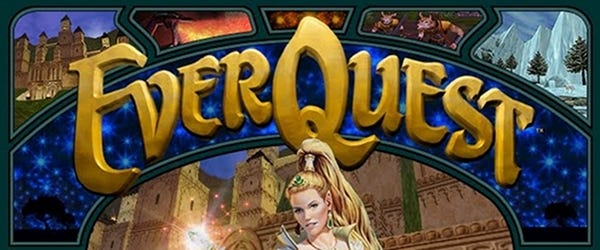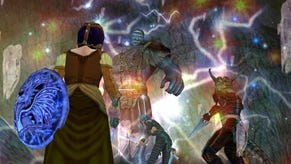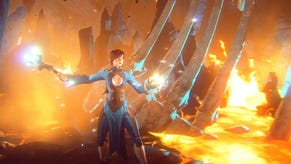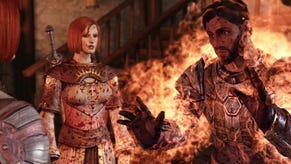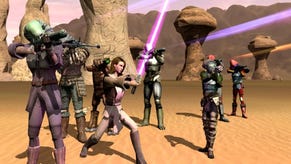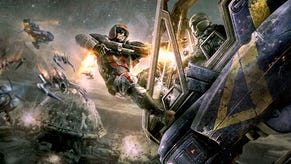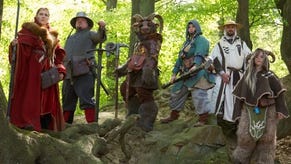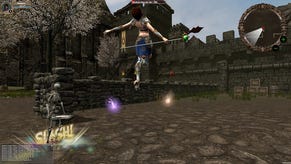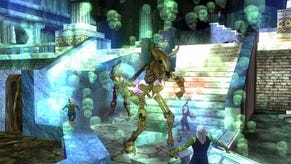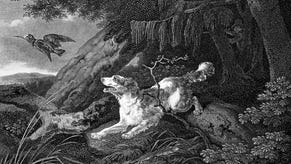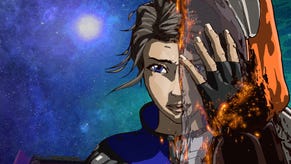Gaming Made Me: EverQuest
Train to zone
This week in our series of highly personal retrospectives on landmark computer games, videogames PhD researcher and independent games developer Mitu Khandaker looks back to the wonder, exploration and lofty world-building of what might well be the most defining entry in the history of MMOs: EverQuest.
Everquest was like magic.
I feel like I’m cheating a bit writing this; after all, this isn’t about one of the games that I played when I was the tiniest, my perception of the world at its most plastic. The games I played then - illicitly, on a Commodore 64 that wasn’t mine; and later, on a series of hand-me-down consoles - certainly defined a lot about the person I would become. However, not all of our most formative experiences happen when we are tiny, young, and impressionable. Instead, many happen when we’re at our most vulnerable, our most confused, our most lost: during our mid-teen years. When I was 16 years old, EverQuest made me.
The thing is, I don’t know quite how to tell you about this. Lots of clever people have said lots of clever things about what games could mean, what they could be. It seems trite, almost, to speak of an experience which was, essentially, about a simple sort of escapism. There are, after all, so many anecdotes about just that. My life was in a complicated sort of situation then. You can blame being a first-generation British-Asian girl. There are probably a few less anecdotes about that. If only there were more. But anyway, this, I guess, is simply mine.
I got into EverQuest about a year after its 1999 release. I’d taken a break from PC gaming for a number of years, all my gaming experiences at the time happening instead on the N64. And so, when a friend intro-duced me to the concept of EverQuest, I was entranced. By that time, the game was already into the first of its many myriad expansions, The Ruins of Kunark, adding yet another vast continent to its already incon-ceivable, breathtaking sense of scope. I had little concept of what might even be possible in this bizarre, new type of game; this massively multiplayer online roleplaying game. A pervasive world. A world that pervades me, my actions, or anything I might do. A world that is, quite frankly, huge. Which has oceans to cross by boat. It blew my mind. I re-read the box and the manual, over and over, as I waited to install it for the first time.
(I wish I still had that original box. As it happens, I only have the Gold Edition box I’d bought to replace it a few years later, when the original CDs had become too scratched, too well-worn, from all the times it had laid about on my teenage desk from all the re-installs. That game went with me on every machine I owned.)
“Any sufficiently advanced technology is indistinguishable from magic”, goes the infamous Arthur C. Clarke aphorism. To me, that’s exactly how EverQuest seemed. Magic. Past the triumphant fanfare of the loading screen, what awaited me was a world teeming with possibility. Having never played anything of the sort before, I simply didn’t know where the limits could lie. And that part of it was so important: I couldn’t see the seams. (Well, okay, there were the LOADING, PLEASE WAIT... notices when zoning. But, for the rest of its magic, I forgave that.)
These days, with being a more experienced programmer, and with my design sensibilities more attuned, I can see through the curtain. Now when I love a game, it is often in a very different sort of way; in the way that we find beauty in the skill and achievement of others. For the most part now, my appreciation of games lies within the cleverness and mastery it took to create it. To me, EverQuest marks the last bastion of my innocence and naivety, which made it seem truly, and irrevocably magical.
After all, in my previous experience, most other games had revolved exclusively around the player; my own success determined the story’s success. A game world was a dead thing; brought to life only in the places I inhabited and encountered. Other games would exist exclusively around - and for - the player; an uncanny solipsism. EverQuest seemed the opposite; a world that lived and breathed, independent of, and even de-spite the player. It would grow, and change, and things would happen, whether or not I was there. That was beautiful.
From this magic, I felt anything could arise, and I loved it all, from the beautiful nonsense of the never-ending plague of giant-rats-who-carry-copper-coins at the gates of West Freeport, to, quite literally, Luclin (the moon) and back. The deserts of Ro, punctuated by an oasis, ripe for hunting low-level, mysteriously oversized sand beetles and spiders - but where, at any time, Cazel the sand giant could pop up and wreak destruction. The inevitable shouts of “Train to zone!” The ensuing corpse runs. This was a massive, hostile world, full of unknown danger. During boat journeys across the Ocean of Tears, I sat pensively, watching for some imagined Kraken. Yet, it was so very tranquil too. Sometimes, I would sit on the dock, half-heartedly fishing, watching that boat pull into the harbour, and away again. Really, I just loved the music there.
In Norrath, each zone felt so different, and so huge. With each area of the world so vast in its own right, the whole seemed more than the sum of its parts; a patchwork of tiny realities. My favourite memories are from my earliest days of the game, when the sense of wonder at the breadth of the world was at its most potent. Of course, it was a sense of wonder that never really went away, either.
EverQuest was a game that got under your skin. There was a reason, I suppose, that it was so widely referred to as EverCrack back in the day. EverQuest gave me a place to be. I mean Be. Sometimes, I would run across the length of one of Norrath’s then-five continents - just to travel. A kind of virtual dromomania. It seemed impossibly huge, the trek from Freeport, across the Commonlands, through the haunted-at-night Kithicor woods, through High Keep, and Highpass Hold into the twisty gorges of East Karana, and then across the vast plains of the Karanas, North and West. It seemed to take forever, and that was okay. Even that arduous-seeming journey was only just a small section of the world, and that was just brilliant.
Yet, exploration is not always simply about distances - often, it is about detail. I remember when, as a still-relatively-new player, I stumbled across a little gap in a wall in East Freeport, and, eventually, found myself in the city’s sewers, which I didn’t even realize existed. That too felt like magic. There were empty houses in North Freeport, with beds upstairs. When I could, I would ‘camp’ in one of those, to pretend I was actually boarding there (even though, of course, I didn’t need to).
The curious cultural differences between the races and their habitats made the world seem all the more alive. The wood elves, with their arboreal city of Kelethin, perched at dizzyingly treacherous heights. Halflings, with their little under-hill homes, and warm fanfare whenever you’d enter their town. The Erudites, mysterious, haughty and exotic, somewhere on a distant island. The intrigue in their dealings with one another. This was a world where even the gods held grudges. To gain faction with one race, may reduce your faction with another. Politics is difficult. A Qeynos guard regards you dubiously.
It was a world teeming in lore, and intrigue. One that I threw myself into wholeheartedly, carefully compiling a folder full of backstories, and of maps. But of course, this tiny reality, re-skinned with fantastical races and drenched in magic, reminds us that our own is just as rich, just as complex.
Looking back, there were these small touches of meaning I couldn’t quite discern at the time. The way the persistence of the world mirrors our own reality - the world goes on, while we’re here for a fleeting amount of time. Only our experiences, and our interactions with one another matter. The world is shaped by the people who inhabit it. It was not the intention of the game designers that the East Commonland tunnels be such a bustling, exotic marketplace; it was the players. It just sort of happened, from the confluence of all these different players.
The implications of all this for me were profound. Getting to know a game this intimately means learning its context and its history. EverQuest grew, of course, out of the tradition of MUDs; I hadn’t even heard of these before, but, once hooked on the latter, I went back to investigate the former. I even created and ran my own MUD, at one point - a derivative of DikuMUD. From there, I went to pen-and-paper roleplaying. I think that devolutionary journey, too, made me.
(Funnily enough, I also ran an EQ pen-and-paper campaign too, a few years later. The books, still in my possession, are gorgeous. Essentially, a reskinned D&D - though, with EverQuest owing its roots to there, that seems wholly appropriate.)
Eventually, time in the real world wore on, and everyone began to move onto new MMOs, and so did I. Of course, by then, I knew how these things worked, and although I certainly enjoyed them, somehow, the obli-vious wonder that had been so key to my love of EverQuest could never be recaptured. It had changed me. That’s not to say I didn’t try again. I dabbled in running an emulated ‘classic’ EverQuest server, to explore the ‘old’ Norrath (which, by that time, had been altered by many more expansions), but it wasn’t ever the same. The zeitgeist moved on. I had moved on. Sometimes games are not just games, they are events, and they just can't happen in the same way a second time.
And so nothing ever recaptured that feeling that EverQuest gave me. The beauty, the wonder, and the pas-sive companionship I shared with everyone else who lived in Norrath back then; those who made it what it was. To those people: A dark elf enchantress regards you warmly.
